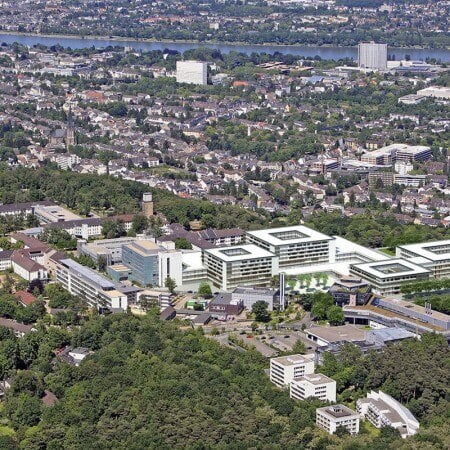Myelodysplastic syndrome is a group of cancers that result in a decreased production of one or more types of blood cells. They acquire a defective structure and cannot perform their functions. The production of red blood cells is mainly affected, while other cells suffer from this condition less often. Every third patient with myelodysplastic syndrome further develops acute myeloid leukemia.
Content
- Principles of treatment
- Stem cell transplant
- Chemotherapy
- Maintenance therapy
The most effective treatment for myelodysplastic syndrome is a stem cell transplant. Doctors in Germany also use chemotherapy, immunotherapy, growth factors, transfusions of blood and its components.
You can undergo your treatment in one of the following hospitals: University Hospital Mannheim, University Hospital Ulm, or University Hospital Freiburg.
The Booking Health company will take care of the organization of your treatment, so you don't have to worry about anything. The Booking Health specialists will select a specialized clinic and a doctor, recommend the best treatment method, help you to get a visa and start your treatment as soon as possible. Our employees will also take care of your travel and accommodation, provide medical insurance, control prices for procedures, and provide an interpreter and a personal coordinator. After completing your treatment, the Booking Health company will keep in touch with your doctor, and you will be able to receive remote consultations.
Principles of treatment
What treatment will be provided, and whether this is required at all, depends on the type of myelodysplastic syndrome, the risk group, the patient's age, and the presence of the del(5q) mutation (when cells lack part of the fifth chromosome).
With normal cell levels in the blood and the absence of symptoms at the time of detection of the disease, doctors may use watchful waiting, and active therapy will be started only if the disease progresses.
The only way to cure myelodysplastic syndrome is an allogeneic bone marrow transplantation (stem cell transplant from a donor). Still, this treatment option is not suitable for older people because of the high risk of severe complications. Other treatments include the use of chemotherapy, immunotherapy, and maintenance therapy. Patients have a constantly decreasing number of cells in their blood, so they need transfusions of blood and its components, as well as the use of growth factors that stimulate bone marrow function.
Stem cell transplant
There are two stem cell transplant options. These are as follows:
- autologous transplant;
- allogeneic transplant.
An autologous transplant uses the patient's own cells. As a rule, this treatment method is not suitable for myelodysplastic syndrome. This is because in the transplantation process of the patient's bone marrow, cancer cells are again administered into the body, even if they were all destroyed earlier. As a result, there will be a high risk of recurrence of the disease.
Doctors mainly perform an allogeneic transplant. The essence of this treatment option is that a patient is given high-dose chemotherapy, which destroys all cancer cells, but, at the same time, destroys the bone marrow. Stem cells from a donor, such as a brother or a sister, can be used to restore it. If there is no suitable donor from among the relatives, an unrelated donor transplant will be performed.
Stem cell transplants are mainly carried out in young healthy patients. In Germany, the procedure can also be used in people over 60 years of age. They undergo a partial (non-myeloablative) transplant. Patients receive less intensive chemotherapy, and the bone marrow will only be partially destroyed. The transplant procedure follows this. Donor cells gradually replace the patient's own, and form a new bone marrow. This variant of the procedure is safer and better tolerated by patients.
Chemotherapy
Chemotherapy cannot cure myelodysplastic syndrome completely. But this treatment option significantly slows down the progression of the disease, improves the quality of life and reduces the need for maintenance therapy.
Doctors prescribe hypomethylating agents and cytostatics for their patients, combining them with immunomodulators, immunosuppressants, and antithymocyte globulin. A successful therapy results in remission and prevents myelodysplastic syndrome from progressing to leukemia. A person may not need blood transfusion procedures at all for a long time.
Maintenance therapy
The following can be used for the treatment of myelodysplastic syndrome in Germany:
- erythropoietin injections to accelerate the maturation of red blood cells;
- transfusion of red blood cells;
- erythrocyte maturation agents can be used when erythropoietin preparations do not work to reduce the need for blood component transfusions;
- chelating agents remove excess iron;
- platelet transfusions;
- antifibrinolytic agents to prevent bleeding;
- antibiotics to suppress infections;
- platelet growth factors: thrombopoietin receptor agonists and interleukin-11;
- leukocyte growth factors: granulocyte-macrophage colony-stimulating factor (in addition to standard drugs, specialists in Germany also opt for long-acting drugs, which are more convenient to use).
You can undergo your diagnostics, treatment and rehabilitation of myelodysplastic syndrome in one of the German hospitals to get the best results. Doctors in this country use the latest drugs and perform stem cell transplant procedures. Patients receive adequate maintenance therapy that ensures the maturation of blood cells, eliminates most symptoms and prevents severe complications.
You can use the Booking Health website to find the prices and make your treatment appointment. The cost of services in German medical centers will be lower for you due to the lack of additional fees for foreign patients. The Booking Health specialists will help you to choose the most suitable clinics in Germany and organize your trip.
Authors:
This article was edited by medical experts, board-certified doctors Dr. Nadezhda Ivanisova, and Dr. Bohdan Mykhalniuk. For the treatment of the conditions referred to in the article, you must consult a doctor; the information in the article is not intended for self-medication!
Our editorial policy, which details our commitment to accuracy and transparency, is available here. Click this link to review our policies.
Sources:
National Center for Biotechnology
American Cancer Society
Cancer Support Community




















